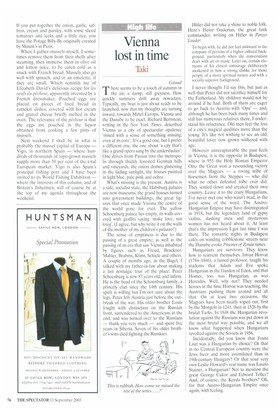Vienna lost in time
Taki
Gstaad
There seems to be a touch of autumn in the air, a damp, still greyness. How quickly summers drift away nowadays. Typically, my boat is just about ready to be launched, now that my thoughts are turning inward, towards Mittel Europa, Vienna and the Danube to be exact. Richard Bernstein, writing in the New York Times, described Vienna as a city of spectacular opulence 'mixed with a sense of something missing, even at its core'. It's a good one, but I prefer a different one, the one about 'a city that's like a grand opera sung by the understudies'. One drives from Passau into the metropolis through thickly forested German hills and vineyards, the onion domes glistening in the fading sunlight, the houses painted in light blue, pale pink and ochre.
What's missing is the present. Austria is a safe, socialist state, the Habsburg palaces are now museums, the grand houses turned into government buildings, the great figures that once made Vienna the centre of the world gone for ever. The yellow Schoenburg palace lies empty, its walls covered with graffiti saying 'make love, not krieg' . (I agree, but why write it on the walls of the mother of my children's palazzo?)
The sense of emptiness is due to the passing of a great empire; as well as the passing of an era that saw Vienna inhabited by figures such as Freud, Bruckner, Mahler, Brahms, Klimt, Schiele and others. A couple of months ago, in the Bagel, talked with my father-in-law about making a last nostalgic tour of the place. Peter Schoenburg is now 87 years old, and infirm. He is the head of the Schoenburg family, a princely clan since the 14th century. His spirit is willing but I'm not sure about the legs. Peter left Austria just before the outbreak of the war. His older brother Louis fought with distinction on the Russian front, surrendered to the Americans at the end, and was turned over to the Russians — thank you very much — and spent five years in Siberia. Seven of his older brother's sons died fighting the Russkies.
Hitler did not take a shine to noble folk. Here's Heinz Guderian, the great tank commander, writing on Hitler in Panzer Leader:
To begin with, he did not feel awkward in the company of persons of a higher cultural background, particularly when the conversation dealt with art or music. Later on, certain elements of his closest entourage deliberately awakened in him a strong dislike for those people of a more spiritual nature and with a socially superior background.
I never thought I'd say this, but just as well that Peter did not sacrifice himself for the Fatherland. My children would not be around if he had. Both of them are eager to go back to Austria with `Opa' — and, although he has been back many times and still has numerous relatives there, I understand his reluctance. Old men feel the loss of a city's magical qualities more than the young. It's like not wishing to see an old, beautiful lover now grown withered with age.
However unrecapturable the past feels in Vienna, it is the opposite in Budapest, where in 955 the Holy Roman Emperor Otto the Great won a resounding victory over the Magyars — a roving tribe of horsemen from the Steppes — who did what no other defeated tribe ever did. They settled down and created their own country. Leave it to the crazy Hungarians. I've never met one who wasn't mad, in the good sense of the word. The AustroHungarian Empire may have disintegrated in 1918, but the legendary land of gypsy violins, dashing men and mysterious women has not heard about it. At least that's the impression I got last time I was there. The romantic nights in Budapest cafés on winding cobblestone streets near the Danube evoke Prisoner of Zenda times.
Hungarians are survivors. They know how to reinvent themselves. Istvan Horvat (1784-1846), a famed professor, taught his students that Adam and Eve spoke Hungarian in the Garden of Eden, and that Homer, too, was Hungarian, as was Hercules. Well, why not? They needed heroes at the time Horvat was teaching, the Austrians pushing them around and all that. On at least two occasions, the Magyars have been nearly wiped out, first by the Mongols in 1241, then in 1526 by the brutal Turks. In 1848 the Hungarian revolution against the Russians was put down in the most brutal way possible, and we all know what happened when Hungarians revolted against the Soviets in 1956.
Incidentally, did you know that Franz Liszt was a Hungarian by choice? Or that in no Central European country were the Jews freer and more assimilated than in 19th-century Hungary? Or that your very own Leslie Howard's real name was Laszlo Stainer, a Hungarian? Not to mention the great George Cukor and Edward Teller? And, of course. the Korda brothers? Oh, for that Austro-Hungarian Empire once again, with feeling.


























































































 Previous page
Previous page